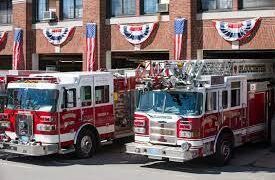‘Step One’ of Phase 3 Reopenings Begin Monday, July 6
GLOUCESTER — Mayor Sefatia Romeo Theken and Public Health Director Karin Carroll wish to share with the residents of Gloucester information about the third phase of Gov. Charlie Baker’s four-phase approach for reopening the state and the mandatory guidelines for businesses allowed to reopen.
Gov. Baker announced today that the third phase of the state’s reopening plan will begin on Monday, July 6, allowing additional industries and sectors to resume or expand operations that day. All industries allowed to reopen will need to adhere to state and local restrictions. Phase three is expected to last longer than previous phases, until the introduction of a reliable therapy or vaccine for COVID-19.
“It’s a relief to see that public health data is showing a trend downward of new cases of this virus Massachusetts, and for our state to have the opportunity to reopen more of our businesses,” Mayor Romeo-Theken said. “While this is a positive step forward, we urge residents: continue practicing safe and healthy habits. Wash your hands, wear your face covering, cover your coughs and sneezes, and please, stay home if you feel ill.”
Monday, July 6 marks “step one” of Phase 3. Industries eligible to reopen and the industry-specific restrictions that they must follow include:
Fitness Centers, including cardio/weight rooms/locker rooms/inside facilities, fitness studios, indoor common areas, and indoor swimming pools
Theaters/Museums/Aquariums, of medium capacity, including indoor and outdoor venues
Non-athletic instructional classes in arts / education / life skills will be open for all ages. Under Phase 2, they were only open for youths under 18 years of age, in groups of fewer than 10
Weddings/events/large gatherings, including gatherings in parks, reservations, and open spaces, as well as outdoor theaters and performance venues
Camps, including sports and arts camps, including overnight camps
Limited organized youth and adult amateur sports programs and activities, open for indoor and outdoor participation
Indoor recreational and athletic facilities for general use, including batting cages, driving ranges, go karts, bowling alleys, arcades, laser tag, roller skating rinks, trampolines, rock-climbing
Sightseeing and other organized tours, including bus tours, duck tours, harbor cruises, whale watching, as well as indoor historical sites
Casinos are also allowed to open gaming floors, following strict distancing protocols from the state, starting Monday.
Outdoor gatherings in enclosed spaces are limited to 25 percent of the facility’s maximum permitted occupancy, with a maximum of 100 people in a single enclosed outdoor space. This includes community events, civic events, sporting events, concerts, conventions and more. This order does not apply to outdoor, unenclosed gatherings if proper social distancing measures are possible.
Public health data will determine when Phase 3 moves from its first step to its second step, with a determination coming over the course of the next few weeks.
The State’s decision to move forward with Phase 3 reopenings was in part due to the positive trend of COVID-19 case data. According to the State’s Dashboard of Public Health Indicators dated Friday, June 5, three of the six indicators are currently trending positive, which also includes the number of patients with COVID-19 in hospitals and the state’s testing capacity.
“In particular, it’s critical as more businesses reopen that everyone takes the public health guidance to stay home when sick seriously, and that employees feel comfortable taking a sick day if needed,” Carroll said. “We urge employees and business owners to have conversations about the realities of this public health crisis, and public health nurses will be in contact with your management to answer any questions and concerns as well.”
More information, as well as the industries that reopened in Phases 1 and 2 and those specific reopening guidelines, can be found here.
Public health officials will continue to monitor COVID-19 case data in the state daily, and the data will serve as a guide for progressing through additional phases of the re-opening plan. Should there be a significant increase in the number of confirmed COVID-19 cases, state officials will order the return to the prior phase.
General, mandatory safety standards that all businesses must adhere to include:
Requiring employees, vendors and patrons to practice social distancing (maintaining six feet between each other), establishing protocols to allow for social distancing among employees and providing signage to promote the practice.
Requiring face coverings or masks for all employees, and providing physical partitions taller than a standing worker where physical distancing is challenging, if necessary (i.e. cashiers).
Providing hand washing opportunities and supplies throughout the workplace to ensure that employees are able to frequently do so.
Regularly disinfected high touch areas, such as workstations, equipment, screens, doorknobs and restrooms throughout the workplace.
Providing training for employees on social distancing and hygiene.
Requiring that any employee who displays symptoms related to COVID-19 stay home from work.
Establishing a plan for employees who contract COVID-19, including cleaning and disinfecting protocols, and a return-to-work plan.
More information about the mandatory safety standards can be found here.
Additional restrictions may be implemented for specific businesses, industry sectors or municipalities in order to prevent local outbreaks. This information will be shared when it becomes available.
Residents are still urged to stay home as much as possible in order to limit their risk for exposure to the novel coronavirus that causes COVID-19. Those who are 65 or older, or have been identified as high risk individuals should they contract the virus are asked to stay home unless absolutely necessary. Restrictions on gatherings of more than 10 people remain in effect.
Should residents leave their homes for any reason, they are asked to take the following steps to help prevent the transmission of respiratory illnesses, including COVID-19:
Wear a face mask or cloth face covering when social distancing is hard to maintain.
Practice social distancing at all times by remaining 6 feet away from others when you must leave your home for trips to open businesses or facilities.
Wash your hands, and clean and disinfect all high touch surfaces, such as doorknobs and countertops.
Stay home if you’re sick and avoid close contact with others.
If symptoms persist, residents are urged to get tested. If a positive test result occurs, follow 14 days of self-quarantine from the date of positive result.






